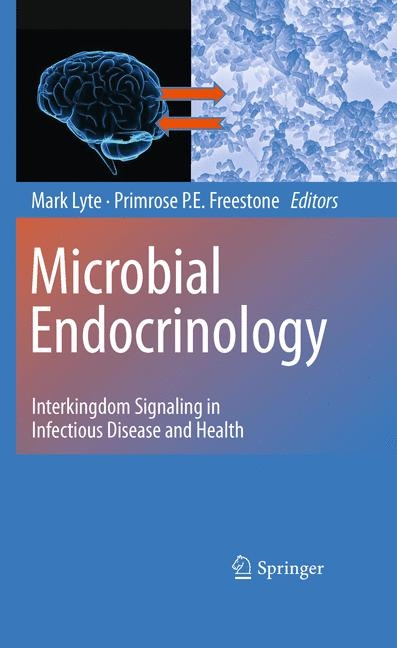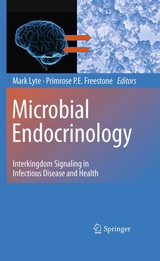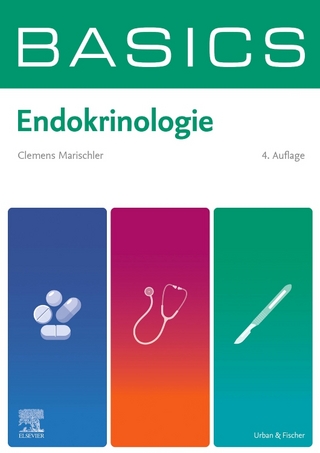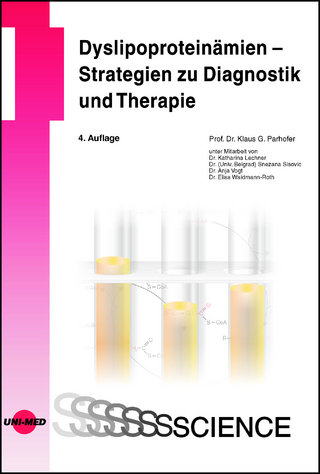Microbial Endocrinology
Springer-Verlag New York Inc.
978-1-4419-5575-3 (ISBN)
- Titel erscheint in neuer Auflage
- Artikel merken
1. Microbial endocrinology: A Personal Journey Mark Lyte Ph.D. - Texas Tech University Health Sciences Center, Lubbock, TX, US 2. Evolutionary considerations of neurotransmitters in microbial, plant and animal Cells Victoria V. Roshchina, Ph.D. - Russian Academy of Sciences, Pushchino, Moscow Region, USSR 3. Mechanisms by which catecholamine stress hormones induce growth in Gram-negative and Gram-positive bacteria Primrose P.E. Freestone, Ph.D. and Sara M. Sandrini, PhD - Leicester University, Leicester, UK 4. Dietary catechols and their relationship to microbial endocrinology Neil Shearer, PhD and Nicholas J. Walton, PhD. - Institute of Food Research, Norwich, UK 5. Interactions between bacteria and the gut mucosa: Do enteric neurotransmitters acting on the mucosal epithelium influence intestinal colonization or infection? David R. Brown, Ph.D. - University of Minnesota, Minnesota, US and Benedict T. Green, Ph.D. - USDA, Logan, UT, US 6. Modulation of the interaction of enteric bacteria with intestinal mucosa by stress-related catecholamines Mark P. Stevens, Ph.D. - Institute for Animal Health, Berkshire, UK 7. The role of microbial endocrinology in periodontal disease Anthony Roberts, Ph.D., BDS - School of Dentistry, University of Manchester, Manchester, UK 8. Staphylococci, catecholamine inotropes and hospital-acquired infections Primrose P.E. Freestone, Ph.D, Noura Al-Dayan, MSc. - Leicester University, Leicester, UK and Mark Lyte, Ph.D. - Texas Tech University Health Sciences Center, Lubbock, TX, US 9. The microbial endocrinology of Pseudomonas aeruginosa John C. Alverdy, M.D., FACS, Kathleen Romanowski M.D., Olga Zaborina Ph.D., Alex Zaborina Ph.D. - University of Chicago, Chicago, IL, US 10. Mechanisms of stress-related modulation of upper and lower respiratory tract infections. Cordula Stover, Ph.D., MD - Leicester University, Leicester, UK 11. Psychological stress, immunity, and the effects on indigenousmicroflora Michael Bailey, Ph.D. - Ohio State University, Columbus, OH, US 12. The epinephrine/norepinephrine/autoinducer-3 inter-kingdom signaling system in Escherichia coli O157:H7 Cristiano Moreira and Vanessa Sperandio, Ph.D. - University of Texas Southwestern Medical Center, Dallas, TX, US 13. Molecular profiling: catecholamine modulation of gene expression in enteropathogenic bacteria Bradley Bearson, Ph.D. - USDA, Ames, IA and Scot Dowd, Ph.D. - USDA, Lubbock, TX, US 14. Microbial signaling compounds as endocrine effectors Aruna Jahoor, PhD, Simon Williams, PhD and Kendra Rumbaugh, Ph.D. - Texas Tech University Health Sciences Center, Lubbock, TX, US 15. Mycolic endocrinology Karl V. Clemons, Ph.D. - California Institute for Medical Research, San Jose, CA, US. Jata Shankar, Ph.D. - Santa Clara Valley Medical Center, San Jose, CA, US and David A. Stevens, Ph.D. - Stanford University, Stanford, CA, US 16. Experimental design considerations for in vitro microbial endocrinology investigations. Richard Haigh Ph.D. - University of Leicester, Leicester, UK
| Erscheint lt. Verlag | 1.6.2010 |
|---|---|
| Zusatzinfo | biography |
| Verlagsort | New York, NY |
| Sprache | englisch |
| Maße | 155 x 235 mm |
| Gewicht | 721 g |
| Themenwelt | Medizinische Fachgebiete ► Innere Medizin ► Endokrinologie |
| Medizin / Pharmazie ► Medizinische Fachgebiete ► Mikrobiologie / Infektologie / Reisemedizin | |
| Medizin / Pharmazie ► Studium | |
| ISBN-10 | 1-4419-5575-5 / 1441955755 |
| ISBN-13 | 978-1-4419-5575-3 / 9781441955753 |
| Zustand | Neuware |
| Haben Sie eine Frage zum Produkt? |
aus dem Bereich




